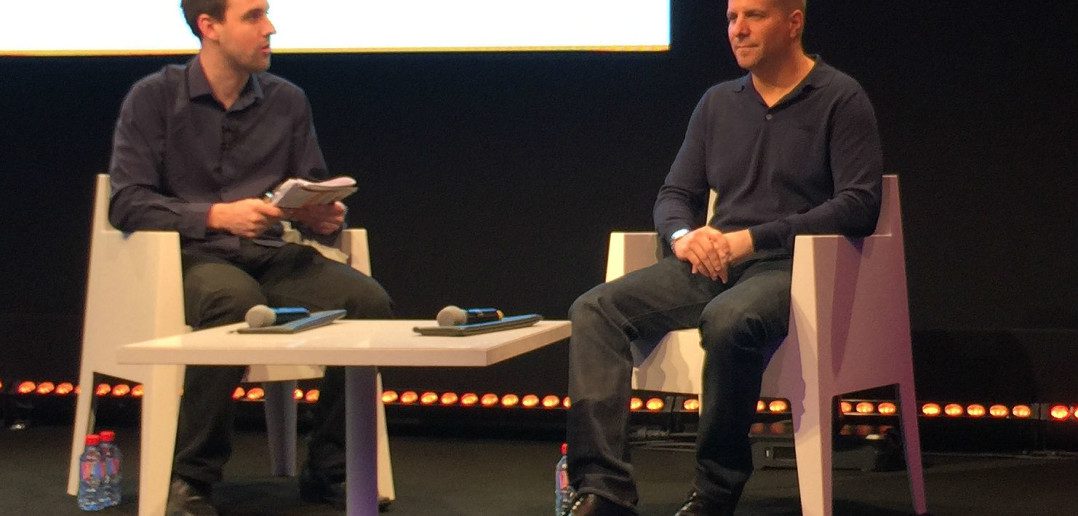Revenge wasn’t served as a cold dish, nobody slept with the fishes, and horses’ heads were nowhere to be seen at this morning’s The Making of the Mob: New York session at MIPDoc, although the new AMC docudrama show’s creator Stephen David had been made an offer he couldn’t refuse to come and talk about it.
David, the Emmy-nominated executive producer of The Men Who Built America and The World Wars, is the man behind the new factual drama exploring the history of the American underworld, including feared-in-their-time names like Salvatore ‘Lucky’ Luciano, Meyer Lansky, Bugsy Siegel and Frank Costello. He was interviewed at MIPDoc by Clive Whittingham, deputy news editor of C21 Media.
“I started looking into the history of the Mob. Everyone’s seen a lot of mob movies, and we know these names, but I didn’t actually know how this came together: how intertwined everyone was. This is the story of how crime was organised. At the beginning you see a lot of mobs just killing each other,” said David.
“It’s a lot of immigrants coming in, and Luciano took over at a young age, and put together a group of people that were able to organise crime. He was what we call an equal opportunity gangster: he would work with anybody. Jews, Irish, anybody!”
He noted that AMC is well known for the great characters in Breaking Bad and other shows, which he said matched his desire to make documentaries from a strong, character-based point of view. “They’re such a character-oriented network. I call this in a way a ‘dude soap opera’! It really is character-based… but at the same time it is still a documentary. We did a ton of research so we could tell the true story.”
David talked about the common theme between The Making of The Mob and The Men Who Built America. “When you look behind this there’s always a very human story. It’s not just connecting the dots, which is somewhat interesting on its own. It’s ‘why did they do this’ – what’s driving people?” he said. “The more you get into the character of a person and the more you feel the world they lived in the more you understand.”
David used to be a screenwriter, and had produced documentaries, and described his move into factual drama as trying to combine the two “without really knowing what I was doing” – but that he has refined the craft over time, leading to The Making of the Mob. “We’re using dramatic scenes with talking heads, with archive, with a lot of visual effects. I think there’s 350 or more visual effects in this show, so you can feel that world, so that when you’re in the scenes it feels real. The idea is even the dramatic stuff is almost supposed to feel like footage that we’ve found.”
He was asked about how the factual drama has exploded for channels like History and National Geographic, and what it means next. “I was actually doing it to try and find a way to do unscripted without being, at the time, reality. There was a lot of competition, so I was trying to do something else,” said David.
“With all of the platforms that are available to us, there are many ways to innovate between scripted and non-fiction, and reality and non-fiction and scripted. We’re going to see a lot more innovation in these worlds, especially as you have smart devices and you can do anything. I think this is just the beginning of the possibilities.”
David showed a clip of a scene from The Men Who Built America showing an elephant walking across a bridge, which elicited the question of how much it costs to rent an elephant in New York for a two-hour shoot – about $8,000, if you’re wondering. But this led on to a conversation about budgets.
“The budget is in between a doc and scripted. It’s much closer to a doc, so I think the budget is much closer to an expensive reality show. It would be an expensive doc rather than scripted. One of the reasons it’s working so well is it does look like that, but the networks are able to charge as if it’s scripted, with the advertising,” said David. “They’re very easy for sponsors: they’re very sponsor-heavy shows without having to be gross about it and stick Coca-Cola in there.”
Do these shows travel well outside the US? Yes, said David. “A lot of these subject matters, it is an international story. The Mob one is especially international, because the mob is all over the world… a lot of the Mob that’s in America was kicked out of Italy by Mussolini,” he pointed out. “Mob is definitely a worldwide story. But these are world-renowned characters, and when we deliver these, we do it in a way that each country can put in their own voiceover in their own language, and they can put in their own interviews. So it can feel like it was made for whatever territory’s airing it.”
David said he has three more series that he’s making this year, and four in 2016. “But I’m selective in the subject matter,” he said, adding that there are a number of distribution partners involved. “There’s quite a variety including Netflix, a variety of channels that are interested in these. They tend to do well throughout the world.” David added that these kinds of projects also lend themselves well to people buying Blu-rays and DVDs. “These are shows that people want to own,” he said.
The World Wars certainly fell into that category: aired as a three-night event. “The idea was almost like the origin stories of all the world leaders we know. When we start looking at it, that 30-year time period: 1914 to 1945, really was one war, and you see it told through the people that you know from World War 2 who were soldiers in World War 1,” he said. “A lot of these are origin stories, it’s like with the Mob, it’s the origin story of the Mob through people.”
David talked about different levels of fact-checking between the various channels, and the quest to remain truthful while not getting too bogged down. “We want to tell it as truthfully as we can,” he said. “I’m compressing 30 years and two wars into six hours, or four and a half hours by the time you have commercials. I’m having to go through things very quickly! I must have spent two weeks researching how World War 1 started, and in the show it’s two minutes… I feel like I could have done 50 episodes. Our lens is usually through character, so as we’re telling these biographies about people, I’ll only include what we find to be very important to those characters’ stakes.”
David was asked about his earlier reference to smart devices: what sort of things is he thinking about doing with smartphones and tablets around his factual dramas? He declined to give away his plans, but talked more generally. “I think if you look into all of the things you can already do with your phone, and what you’re gonna be able to do. There’s a lot of potential for new ways… I think storytelling is storytelling, but I think there are additives to it. Especially with these types of shows, I’ll watch Twitter, and you can tell people are watching the show and on Wikipedia looking up stuff,” he said. Watch this space.
Check out MIPTV, MIP Digital Fronts, MIPDoc & MIPFormats 2015 full live coverage




